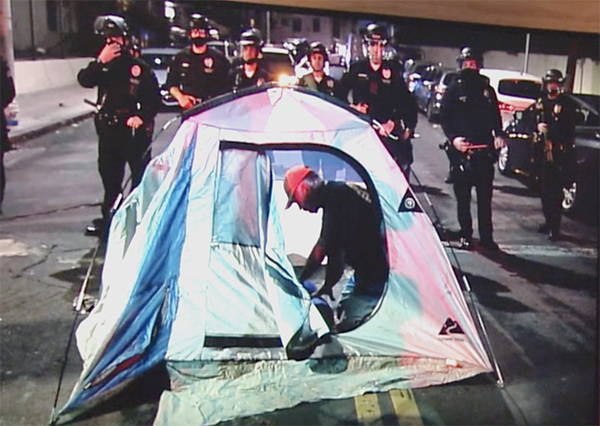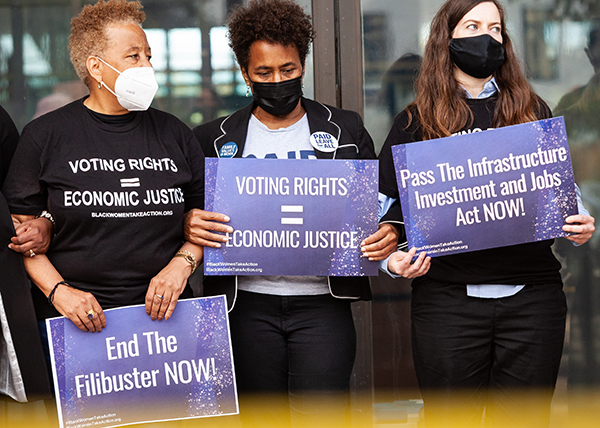
Photo / video still LA Times
Mainstream media have declared that the Democrats losing the Virginia governor’s race means the Democratic Party should isolate progressives and be more “moderate” in its policies if it wants to compete with the increasingly far-right Republican Party. The pundits warn that, if not, Democrats could lose control of Congress next year, and lose the White House in 2024.
Of course this view ignores the fact that Terry McAuliffe, who was the Democratic gubernatorial candidate in Virginia, is a moderate—and he lost. Moderation is not what’s needed!

Photo / © Allison Bailey / NurPhoto via ZUMA Press
At a time when the economy is on shaky ground, when a pandemic has upended our lives, when millions are fighting homelessness and poverty, when many communities are fighting simply for clean water in their homes, when overt racism is being used as a weapon, when young people see no future for themselves and where thousands are in the streets demanding action on the climate emergency, when police violence is out of control, when migrants and refugees are treated like cattle, when millions are without health care,when the right to vote is under threat, when the far right is attempting coups and making death threats against public officials and candidates with the apparent aim of destroying democracy and imposing a dictatorship on our country, now is NOT the time for moderation—that’s the lesson of Virginia.
For practical purposes, through their actions, the “moderate” Democrats (also known as corporate Democrats) are helping the Republicans win elections and carry out their extreme right agenda.
Virginia is a case in point. McAuliffe lost by trying to tie his opponent to Trump instead of putting forward a real program in the interest of working class Virginians. He relied on endorsements from national figures like Joe Biden and talked about the infrastructure bill then before Congress, instead of dealing properly with local issues. Some parents who were interviewed said they didn’t care about the infrastructure bill, they were concerned about what their children were taught in the public schools. McAuliffe said parents shouldn’t have a say in what was taught. Former Virginia Gov. Douglas Wilder, the first Black governor elected in the U.S., told the media in interviews before the election that this was a serious misstep on McAuliffe’s part.
Wilder also blasted McAuliffe and the Democratic Party for taking the African American vote for granted while doing little for African Americans. He noted that when McAuliffe was governor from 2014-2018, he had the opportunity to push for funding for historically Black colleges and universities, and failed to do so. Wilder also pointed out that “All the people he [McAuliffe] ran against for governor for the most part in the Democratic Party [primary] were Black.” Despite pleas from younger Virginia Democratic Party members that it was time to run a woman of color for governor, the party leadership got behind McAuliffe, an old guard party hack.
McAuliffe’s Republican opponent, Glenn Youngkin, didn’t put forward a program in the interest of the people either—quite the opposite. He won by staying away from Trump, relying on racist dog whistles, and speaking to the local issues that concerned voters, such as education and funding for Black colleges. He spoke to the issues in a divisive and manipulative way, but he spoke to them.
Elections have consequences. In Virginia, the election results could have a negative impact on voting rights going forward. Republicans there not only won the governor’s race, they won the offices of lieutenant governor and attorney general, and also regained majority control of the Virginia House of Delegates, leaving the Democrats with only a two-vote majority in the Virginia Senate. Travis Waldron, writing in HuffPost, describes the potential result: “Democrats, who won control of the Virginia state legislature in 2019, passed new laws to expand early and absentee voting and allow Sunday voting for the first time. They repealed the state’s restrictive photo-ID requirement and approved one of the nation’s most expansive laws to protect the right to vote, a state-level version of the Voting Rights Act of 1965 that specifically outlawed discrimination based on race, ethnicity or disability status and restored key provisions of the federal law that long oversaw Virginia elections before Supreme Court rulings gutted it. Together with aggressive efforts from three successive governors to restore voting rights to people with felony convictions, the new laws produced a striking transition in the heart of the Old South: Last year, Virginia moved from 49th to 12th in one ranking of how easy it is to vote in each state.” All these reforms, Waldron notes, are now at risk of repeal because of the Republican victories this year.
This is not a suggestion to choose the Democrats as the lesser of two evils. It is a demand for an end to moderation, a demand that Democratic politicians and all others be held accountable by the mass movement to take a real and credible standfor the working class, and for democracy. This means politicians taking a stand against racism, against voter suppression, and against police violence. It means putting forward a serious program at election time (and between elections) to deal with the real issues confronting the people in their daily lives. In Congress it means ending the filibuster and passing the voting rights bills and economic legislation the people need. It means having a government that will rein in the violent, fascist right and guarantee that the people’s needs are met.
The danger of an open, violent dictatorship being imposed on America in the next few years—facilitated by the weakness of the Democratic “moderates”—is a serious threat, but it can be stopped by the growing movement for a democratic society that meets the people’s needs. That movement is huge. It must continue to escalate its fight, become more unified, get more organized at the local level around basic issues, get more people running for office, and mobilize more voters. It must not let up constantly pressuring the government to meet our needs.
A key battle in the war to create a real democracy in America will be won or lost in the next three years. The time to act is now.

